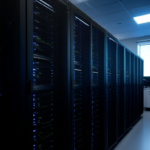Introduction: The Power of Open Source Contributions
Open source projects are the backbone of modern technology, driving innovation and fostering collaboration across industries. By contributing to open source, developers not only enhance their technical skills but also play a pivotal role in shaping the future of software development. These projects provide a platform for individuals to collaborate on solving real-world problems, democratizing access to cutting-edge tools, and promoting transparency in technology. In 2025, as emerging technologies continue to evolve at an unprecedented pace, open source contributions have become more critical than ever. Whether you’re a seasoned developer or a newcomer eager to learn, participating in open source communities offers unparalleled opportunities for growth, networking, and making a tangible impact.
Artificial Intelligence: Advancing the Frontiers of Innovation
1. TensorFlow
Description: TensorFlow is one of the most widely used open source libraries for machine learning and deep learning. Developed by Google, it provides tools for building and deploying AI models across various platforms.
Significance in 2025: As AI continues to revolutionize industries like healthcare, finance, and autonomous systems, TensorFlow remains at the forefront of enabling scalable and efficient model development. Its robust ecosystem supports everything from research to production-grade applications.
Skills Required: Proficiency in Python, familiarity with machine learning concepts, and experience with neural networks are essential. Knowledge of C++ can be beneficial for optimizing performance-critical components.
Potential Impact: Contributors gain hands-on experience with state-of-the-art AI frameworks while helping to improve accessibility and functionality for millions of users worldwide. This project is ideal for those looking to deepen their expertise in AI and make a lasting impact on its evolution.
2. Hugging Face Transformers
Description: Hugging Face Transformers is a library that simplifies the use of pre-trained language models, such as BERT and GPT, for natural language processing (NLP) tasks.
Significance in 2025: With the growing demand for advanced NLP capabilities in applications like chatbots, content generation, and sentiment analysis, this library has become indispensable. It empowers developers to leverage powerful models without extensive computational resources.
Skills Required: Strong Python skills, understanding of NLP principles, and experience with PyTorch or TensorFlow are prerequisites. Familiarity with large-scale datasets is advantageous.
Potential Impact: By contributing to Hugging Face, developers can accelerate the adoption of NLP technologies and contribute to groundbreaking advancements in human-computer interaction.
Web Development: Building the Digital Future
1. React
Description: React is a JavaScript library developed by Facebook for building user interfaces, particularly single-page applications. Its component-based architecture makes it highly modular and reusable.
Significance in 2025: As businesses increasingly prioritize dynamic and responsive web experiences, React remains a dominant force in front-end development. Its flexibility and performance optimizations ensure relevance in an ever-changing digital landscape.
Skills Required: Solid knowledge of JavaScript, HTML, and CSS is mandatory. Experience with JSX syntax and functional programming concepts will enhance your ability to contribute effectively.
Potential Impact: Contributing to React allows developers to influence how modern web applications are built, benefiting countless organizations and end-users globally.
2. Next.js
Description: Next.js is a framework built on top of React, designed to simplify server-side rendering, static site generation, and other advanced features for web applications.
Significance in 2025: With the rise of Jamstack architectures and the need for faster, SEO-friendly websites, Next.js has gained immense popularity. It bridges the gap between simplicity and scalability, making it a go-to choice for developers.
Skills Required: Expertise in React, Node.js, and web development best practices is crucial. Understanding of API routes and deployment strategies adds value to contributions.
Potential Impact: By improving Next.js, contributors help streamline the development process for thousands of web projects, enhancing both efficiency and user experience.
Cybersecurity: Safeguarding the Digital World
1. OWASP ZAP
Description: OWASP Zed Attack Proxy (ZAP) is an open source security tool used for finding vulnerabilities in web applications during development and testing phases.
Significance in 2025: Cyber threats are escalating, and securing web applications is paramount. OWASP ZAP provides developers and security professionals with a reliable way to identify and mitigate risks proactively.
Skills Required: Knowledge of web application security principles, scripting languages like Python or JavaScript, and familiarity with penetration testing methodologies are key requirements.
Potential Impact: Contributions to OWASP ZAP strengthen global cybersecurity efforts, protecting businesses and individuals from malicious attacks while advancing ethical hacking practices.
2. Metasploit
Description: Metasploit is a penetration testing framework that enables security researchers to discover, exploit, and validate vulnerabilities in systems.
Significance in 2025: As organizations strive to stay ahead of cybercriminals, Metasploit serves as a vital resource for simulating attacks and fortifying defenses against potential breaches.
Skills Required: Proficiency in Ruby, networking protocols, and operating system internals is necessary. A background in ethical hacking is highly recommended.
Potential Impact: By enhancing Metasploit, contributors directly contribute to the fight against cybercrime, empowering defenders to protect critical infrastructure and sensitive data.
Data Science: Unlocking Insights Through Collaboration
1. Pandas
Description: Pandas is a Python library offering high-performance, easy-to-use data structures and analysis tools, widely adopted in the data science community.
Significance in 2025: Data-driven decision-making is central to business success, and Pandas facilitates efficient data manipulation and exploration. Its versatility ensures continued prominence in analytics workflows.
Skills Required: Strong Python programming skills, familiarity with NumPy, and experience working with structured data are prerequisites. Contributions may involve writing code, documentation, or tutorials.
Potential Impact: Improving Pandas enhances the productivity of data scientists worldwide, enabling them to derive actionable insights faster and more accurately.
2. Apache Spark
Description: Apache Spark is a unified analytics engine for large-scale data processing, supporting batch, streaming, SQL queries, and machine learning.
Significance in 2025: The exponential growth of big data necessitates scalable solutions, and Spark addresses this need with its distributed computing capabilities. It powers mission-critical applications across industries.
Skills Required: Expertise in Java, Scala, or Python, along with a solid understanding of distributed systems and parallel processing, is required. Contributions could focus on optimization, new features, or bug fixes.
Potential Impact: Enhancements to Apache Spark enable organizations to harness the full potential of their data, driving innovation and competitive advantage.
Sustainability Tech: Paving the Way for a Greener Future
1. OpenEnergyMonitor
Description: OpenEnergyMonitor is an open source project focused on monitoring energy usage and promoting sustainable living through accessible hardware and software solutions.
Significance in 2025: As climate change becomes a pressing concern, initiatives like OpenEnergyMonitor empower individuals and communities to reduce their carbon footprint and transition to renewable energy sources.
Skills Required: Electronics engineering, embedded systems programming, and IoT development skills are valuable. Creativity in designing eco-friendly solutions is encouraged.
Potential Impact: Contributions to OpenEnergyMonitor promote environmental sustainability, inspiring others to adopt greener lifestyles and combat climate change collectively.
2. FarmBot
Description: FarmBot is an open source CNC farming robot designed to automate gardening and agriculture, increasing food production efficiency while minimizing resource consumption.
Significance in 2025: Addressing global food security challenges requires innovative agricultural technologies. FarmBot exemplifies how automation can revolutionize traditional farming practices sustainably.
Skills Required: Mechanical design, robotics, and software development expertise are essential. Passion for sustainable agriculture is a plus.
Potential Impact: By advancing FarmBot, contributors support the creation of resilient food systems, reducing waste and conserving natural resources for future generations.
Conclusion: Join the Movement and Make a Difference
Contributing to open source projects is not just about coding; it’s about being part of a global movement that drives technological progress and addresses societal challenges. The projects highlighted in this article represent some of the most impactful and innovative initiatives across diverse domains, offering unique opportunities for personal and professional growth. Whether you’re passionate about artificial intelligence, web development, cybersecurity, data science, or sustainability tech, there’s a project waiting for your contributions.
By participating in these communities, you’ll gain invaluable skills, expand your network, and leave a lasting legacy in the tech world. So why wait? Dive into open source today, and take the first step toward shaping the future of technology!


